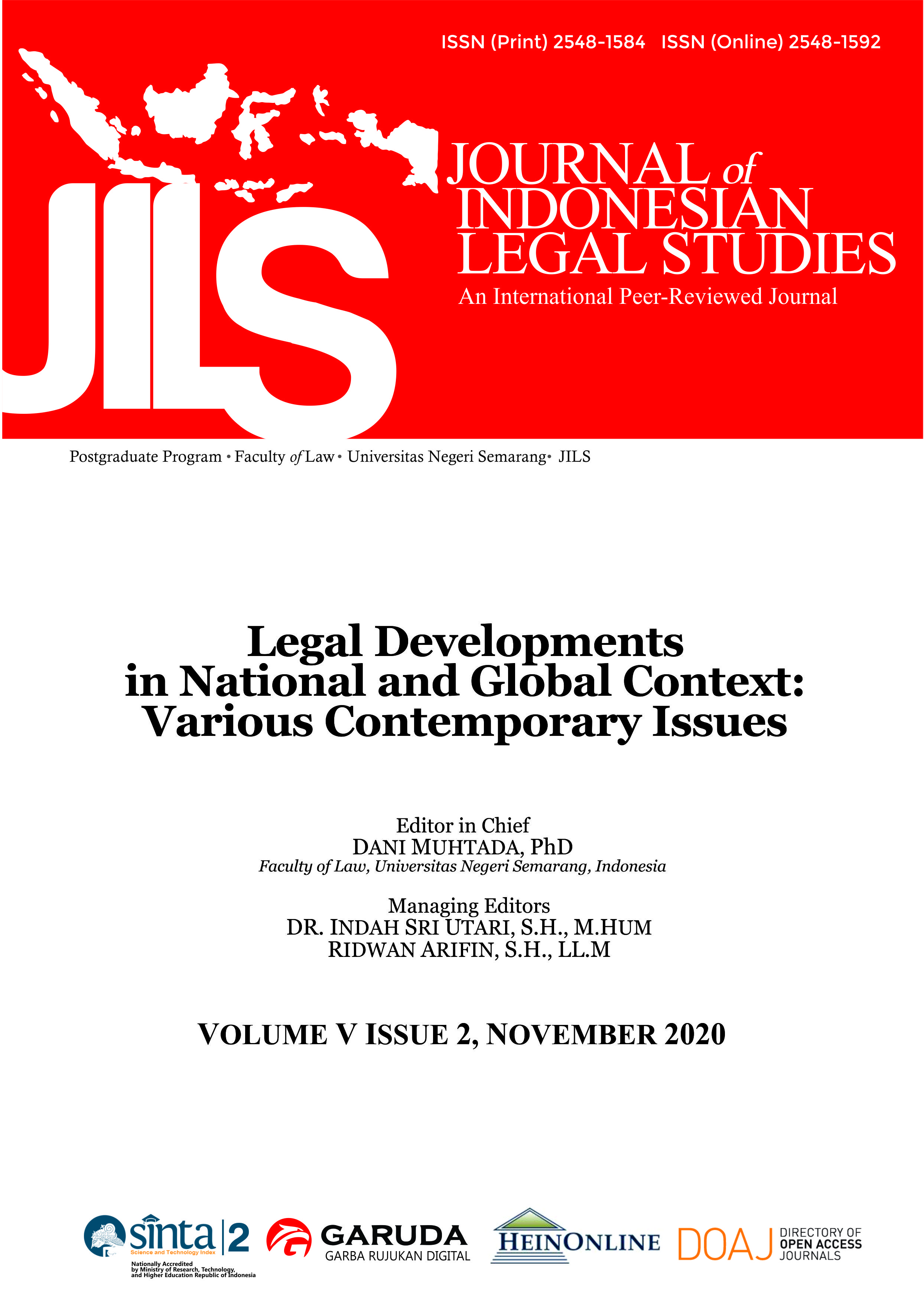Legal Principle Between Concept and Content
Main Article Content
Abstract
The article is devoted to the study of the legal nature of legal principles. The purpose of the article is a comprehensive study of the legal and social aspects of the essence and content of the legal principle as a philosophical and legal category. The methodological basis of the article is an integrative approach to the study of legal reality, which allowed us to combine general scientific and private scientific methods developed in various scientific paradigms and study the principles of law not only ontologically, but also epistemologically and axiologically, taking into account the phenomenological and communicative aspects of their content, development, and functioning. This paper emphasized that the study of legal principles not only in the legal, but also in the general social context allows us to conclude that this category is fundamental in the construction of legal reality cognitively, functionally, and normatively. The legal principle is the conventional result of legal communication. As a fundamental category of legal reality, the principle determines the nature of its analysis, interpretation, and evaluation. The scientific novelty of the article is determined by the specifics of the research methodology and the findings obtained, which allow us to determine the fundamental role of the legal principle at all levels of legal reality. The practical significance of the article lies in the ability to use the findings in the study of other aspects of the development and functioning of legal reality, as well as in generating forecasts for the development of the national legal system.
Article Details

This work is licensed under a Creative Commons Attribution-ShareAlike 4.0 International License.
All writings published in this journal are personal views of the authors and do not represent the views of this journal and the author's affiliated institutions. Author(s) retain copyrights under the licence of Creative Commons Attribution-ShareAlike 4.0 International (CC BY-SA 4.0).
References
Arnold, T. W. (1969). Law as Symbolism. In.: Aubert V. (ed.). Sociology of Law. Selected Readings, Baltimore: Penguin Books.
Bell, J., Boyron, S., & Whittaker, S. (2008). Principles of French law. Second Edition. N.-Y: Oxford University Press.
Berger, P. L., & Luckmann, T. (1991). The Social Construction of Reality: A Treatise in the Sociology of Knowledge. N.Y: Penguin Books.
Bix, B. H. (2017). Introduction. In: Frank J. Law and Modern Mind. London, N.Y: Routledge.
Cankorel, T. (2008). Cognitive Classification of legal Principles: a new Approach to international legal Training. Ankara Law Review, 5 (2). 153-200.
Daci, J. (2010). Legal Principles, Legal Values and Legal Norms: are they the same or different? Academicus International Scientific Journal, 1(2). 109-115.
De Montesquieu, C. (1989). Montesquieu: The Spirit of the Laws. Cambridge: University Press: Cambridge.
Dworkin, R. (1988). Law’s Empire. Cambridge: Harvard University Press.
Ershov, V. V. (2018). The essence of the principles of law. Journal of Siberian Federal University. Humanities & Social Sciences, 11(12). 2089 2103.
Friedman, L.M. 2019. A History of American Law. 4th ed. Cambridge: Oxford University Press.
Gessner, V. (1994). Global Legal Interaction and Legal Cultures. Ratio Juris. An International Journal of Jurisprudence and Philosophy of Law, 7(2). 132 145.
Gurvitch, G. (2001). Sociology of Law. New Brunswick: Transaction Publishers.
Habermas, J. (1973). Legitimationsprobleme im Spctkapitalismus. Suhrkamp Verlag: Frankfurt am Main. (in Germ.)
Habermas, J. 1996. Die Einbeziehung des Anderen. Studien zur politischen Theorie. Suhrkamp Verlag: Frankfurt am Main. (in germ.)
Hart, H. L. A. (1961). The Concept of Law. N.Y: Oxford University Press.
Hart, H. L. A., & Carrió, G. R. (1961). El concepto de derecho (pp. 149-150). Buenos Aires: Abeledo-Perrot.
Hramcova, N.G. (2010). Teoriya pravovogo diskursa: bazovye idei, problemy, zakonomernosti [Theory of legal discourse: basic ideas, problems, patterns]. Izd-vo Kurganskogo gos. un-ta: Kurgan. (in Russ.)
Johnson, D. R., & Post, D. (1996). Law and Borders: The Rise of Law in Cyberspace. Stanford Law Review, 48 (5). 1367 1402.
Krasnov, A. V. (2019). Legitimnost' prava: aksiologicheskij aspekt [Legitimacy of the Law: Axiological Aspect]. The Review of Economy, the Law and Sociology, 1. 87 90. (in Russ.).
Krawietz, W. (2008). “Juridische Kommunikation im modernen Rechtssystem in rechtstheoretischer Perspektiveâ€. In: Brugger W., Neumann, U., & Kirste, S. (eds.) Rechtsphilosophie im 21. Jahrhundert. Suhrkamp: Frankfurt-am-Main. (in Germ.)
Llewellyn, K. (1989). The Case Law System in America. Chicago: The University of Chicago Press.
Lyons, D. (1977). Principles, positivism, and legal theory. The Yale Law Journal. 87 (2). 415 435.
M. Van Hoecke. (2002). Law as Communication. Oxford: Hart Publishing.
Miller, D. 1999. Principles of Social Justice. Cambridge: Harvard University Press.
Postema, G. J. (2003). Law’s Melody: Time and the Normativity of Law. A Realist Approach to the Objectivity of Norms and Law. Associations. Journal for Legal and Social Theory, 7 (1). 227 239.
Puchta, G.F. 1965. Das Gewohnheitsrecht. 2 vols. Reprint, Wissenschaftliche Buchgesellschaft: Darmstadt. (in Germ.).
Raz, J. (1972). Legal Principles and the Limits of Law. The Yale Law Journal, 81. 823 854.
Raz, J. (2005). “The Rule of Law and its Virtueâ€. In: Bellamy, R. (ed.). The Rule of Law and the Separation of Powers. London: Routledge.
Rüthers, B., & Fischer, Ch. (2010). Rechtstheorie: Begriff, Geltung und Anwendung des Rechts. 5. Auflage. Verlag C. H. Beck: München. (in Germ.)
Selznick, P. (1961). Sociology and natural law. Natural Law Forum, 61, 84-108.
Skorobogatov, A.V, Bulnina I.S., Krasnov A.V., & Tyabina, D. V. (2015). Legal reality as a journal category. Mediterranean Journal of Social Sciences, 6 (3). 664 668.
Skorobogatov, A.V., & Malik, A. A. (2019). Legitimaciya zakona v yuridicheskom diskurse [Legitimation of law in juridical discourse]. Actual Problems of Economics and Law, 13 (3). 1370–1378 (in Russ.).
Wiethölter, R. (2011). Proceduralization of The Category of Law+. German Law Journal, 12(1), 465-473.
Wright, R. G. (2017). Objective and Subjective Tests in the Law. The UNH Law Review, 16(1). 121 146.
